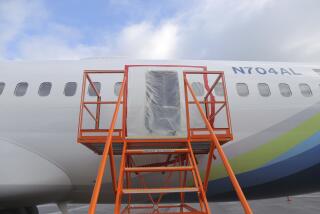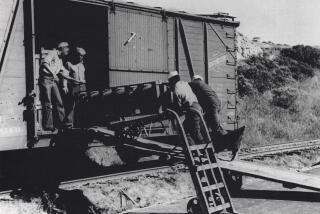Safety Panel Spreads Blame in Exxon Spill : Environment: The captain, mate, owner, Coast Guard and Alaska pilot services all draw criticism for the accident in Prince William Sound.
- Share via
WASHINGTON — Federal investigators spread blame widely for the Exxon Valdez oil spill Tuesday, faulting Exxon Corp. for not providing “a fit master and a rested and sufficient crew” and also blaming the captain, his third mate, the Coast Guard and local authorities.
The National Transportation Safety Board voted 4 to 0 in determining a five-part probable cause for the nation’s worst oil spill, the dumping of 11 million gallons of crude oil into Alaska’s Prince William Sound by the grounding of the tanker Exxon Valdez on March 24, 1989.
The board said the third mate failed to properly maneuver the vessel, the alcohol-impaired captain failed to give proper supervision, Exxon failed to provide a crew up to its task, the Coast Guard failed in marine traffic control and the state of Alaska failed to provide adequate piloting rules.
The board, concluding a 16-month investigation, criticized the captain of the Exxon Valdez, Joseph Hazelwood, for leaving his third mate, Gregory Cousins, at the helm before the ship ran aground.
It also said witnesses, medical tests and an unusual study of Hazelwood’s speech indicated he was drunk when the ship ran aground, even though an Alaska jury acquitted the captain of being intoxicated and the Coast Guard dropped a drunkenness charge.
Hazelwood’s attorney, Thomas Russo, who attended the board meeting, said the board members acted “like they dropped off the moon” in accusing Hazelwood of being drunk. Twenty-one witnesses testified at his trial that he was sober, Russo said, and authorities botched blood tests, taken more than 10 hours after the accident, that showed the presence of alcohol.
“Their conclusions are not founded in the evidence,” Russo said.
Hazelwood was convicted of one misdemeanor charge of negligent discharge of oil. He was fined $50,000 and ordered to spend 1,000 hours cleaning Alaskan beaches. He has appealed.
Last week, the Coast Guard dismissed charges of drunkenness and misconduct against Hazelwood but suspended his license as a ship’s master for nine months after he pleaded no contest to breaking Coast Guard rules.
The violations included drinking within four hours before taking command of the vessel and leaving the bridge to the other officer while the tanker was headed for jagged Bligh Reef, where it split open.
Board Chairman James Kolstad said the board hopes its report, which included 36 safety recommendations, will help prevent future spills. Its analysis carries no force of law and, by statute, cannot be used in court cases.
“This is the largest and costliest accident the safety board has ever investigated,” said Kolstad in opening the meeting. He said $2 billion had been spent cleaning up the spill.
More to Read
Sign up for Essential California
The most important California stories and recommendations in your inbox every morning.
You may occasionally receive promotional content from the Los Angeles Times.










